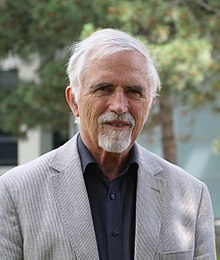Rudolf Wille (mathematician)
Rudolf Wille (born November 2, 1937 in Bremen ; † January 22, 2017 in Bickenbach (Bergstrasse) ) was a German mathematician and professor at the Mathematics Department at TU Darmstadt .
Scientific career
Wille studied mathematics, musicology and philosophy at the Philipps University in Marburg and the Johann Wolfgang Goethe University in Frankfurt am Main . In 1961 he passed his state examination in mathematics and in 1963 in school music, and in 1966 he received his doctorate in mathematics under Ernst-August Behrens (semi-complementary associations) . In 1970 he took up the professorship in Darmstadt; from 1976 he was also a member of the board of directors of the Institute for Philosophy at the TU Darmstadt for many years. In 2003 he retired.
Act
Rudolf Willes was particularly interested in formal conceptual analysis and, on its basis, conceptual knowledge processing. Further research interests were general algebra , order and association theory , basics of geometry , discrete mathematics , measurement theory , mathematical music theory , philosophy of science and contextual logic .
Rudolf Wille wrote the article Restructuring lattice theory: An approach based on hierarchies of concepts. This article was published for the first time in 1981 and, due to its fundamental importance, has been reprinted several times, including in a conference proceedings from 2009.
In 1983 he set up the research group Formal Concept Analysis, which included Bernhard Ganter , Peter Burmeister and Karl Erich Wolff , among others . The term "formal concept analysis" was coined by him. From the preparatory work of Garrett Birkhoff and some French mathematicians and philosophers, it was essentially further developed to its current status under his direction and moderation by the research group.
The main clause on concept lattices goes back to Rudolf Wille .
In addition to the mathematical foundation, it was always important to Rudolf Wille not only to develop a mathematical calculation, but an instrument that opens up new possibilities for people to deal with large amounts of data and to understand them. A close collaboration with the psychology professor Thomas Bernhard Seiler developed from this concern .
In 1993 he founded the " Ernst Schröder Center for Conceptual Knowledge Processing e. V. “, which is dedicated to the same research goal. (See also: Ernst Schröder ).
Rudolf Wille supervised more than 100 diploma and state examination theses in mathematics, 52 dissertations and 8 habilitations. Many of his students have now been appointed to chairs themselves, including Bernhard Ganter , Thomas Ihringer , Katja Lengnink, Susanne Prediger and Gerd Stumme.
Private
Wille was the younger brother of Friedrich Wille . He was married to Renate Wille-Henning. A daughter, Uta Wille, emerged from the marriage.
Fonts
Rudolf Wille is the author of more than 200 scientific publications and co-author of the first textbook on formal concept analysis. To
- Wille, Rudolf, Monika Zickwolf (Ed.): Conceptual knowledge processing: basic questions and tasks . BI Wissenschaftsverlag, Mannheim et al. 1994, ISBN 3-411-17241-X .
- Bernhard Ganter, Rudolf Wille, Karl-Erich Wolff: Contributions to concept analysis . BI Wissenschaftsverlag, Mannheim et al. 1987, ISBN 3-411-03157-3 .
- Bernhard Ganter, Rudolf Wille: Formal Concept Analysis: Mathematical Foundations . Springer, 1999, ISBN 3-642-59830-7 , doi : 10.1007 / 978-3-642-59830-2 .
- Gerd Stumme, Rudolf Wille: Conceptual knowledge processing: methods and applications . Springer, Berlin / Heidelberg 2000, ISBN 3-642-57217-0 , doi : 10.1007 / 978-3-642-57217-3 .
- Bernhard Ganter, Gerd Stumme, Rudolf Wille (Eds.): Formal Concept Analysis: Foundations and applications . Springer, Berlin 2005, ISBN 3-540-27891-5 , doi : 10.1007 / 978-3-540-31881-1 .
Web links
- Literature by Rudolf Wille. Ernst Schröder Center , accessed on January 26, 2017 .
- Literature by and about Rudolf Wille in the catalog of the German National Library
- Entry in The Mathematics Genealogy Project
Individual evidence
- ^ Rudolf Wille: Obituary notice. FAZ , January 25, 2017, accessed on January 29, 2017 .
- ^ Mourning portal: Rudolf Wille. Echo Medien , January 25, 2017, accessed January 29, 2017 .
- ↑ a b Rudolf Wille. Mathematics Genealogy Project , accessed January 25, 2017 .
- ^ Rudolf Wille: Restructuring lattice theory: An approach based on hierarchies of concepts . Ed .: Department of Mathematics, TH-Darmstadt. Darmstadt 1981 ( online evidence [accessed June 13, 2014]).
- ^ Rudolf Wille: Restructuring lattice theory: An approach based on hierarchies of concepts . In: Reprint: ICFCA '09: Proceedings of the 7th International Conference on Formal Concept Analysis . Springer, Berlin, Heidelberg 2009, ISBN 978-3-642-01814-5 ( reading sample [accessed June 13, 2014]).
- ↑ Bernhard Ganter: Discrete Mathematics: Ordered Sets. Springer Spektrum, Berlin and Heidelberg 2013, p. 66, pp. 167–168.
- ↑ Previous colloquia and seminars of the Ernst Schröder Center. Ernst Schröder Center for Conceptual Knowledge Processing, accessed on April 17, 2018 .
- ↑ a b Orally confirmed by Bernhard Ganter and Peter Burmeister
- ↑ She is also a mathematician: Uta Wille. Mathematics Genealogy Project , accessed March 22, 2017 .
| personal data | |
|---|---|
| SURNAME | Will, Rudolf |
| BRIEF DESCRIPTION | German mathematician and university professor |
| DATE OF BIRTH | November 2, 1937 |
| PLACE OF BIRTH | Bremen |
| DATE OF DEATH | 22nd January 2017 |
| Place of death | Bickenbach (Bergstrasse) |
